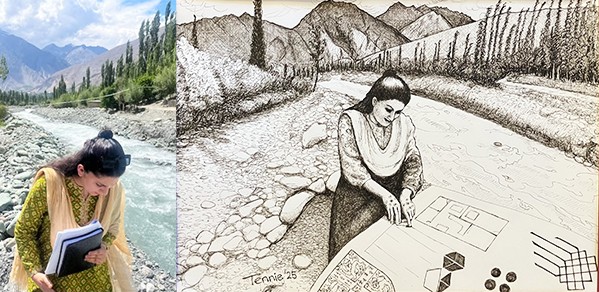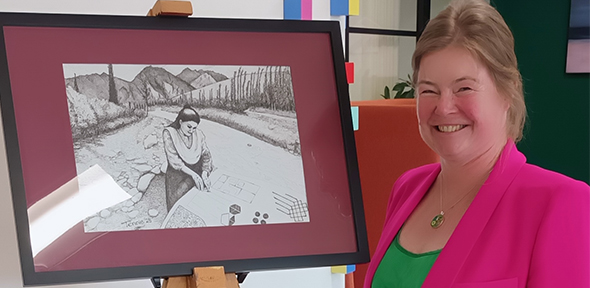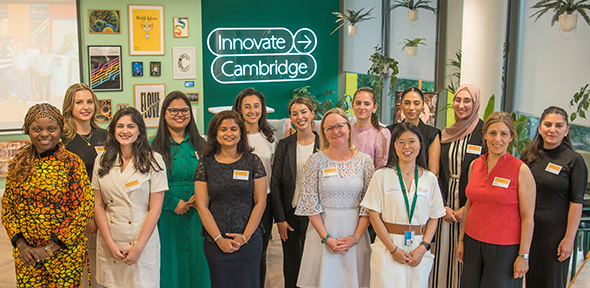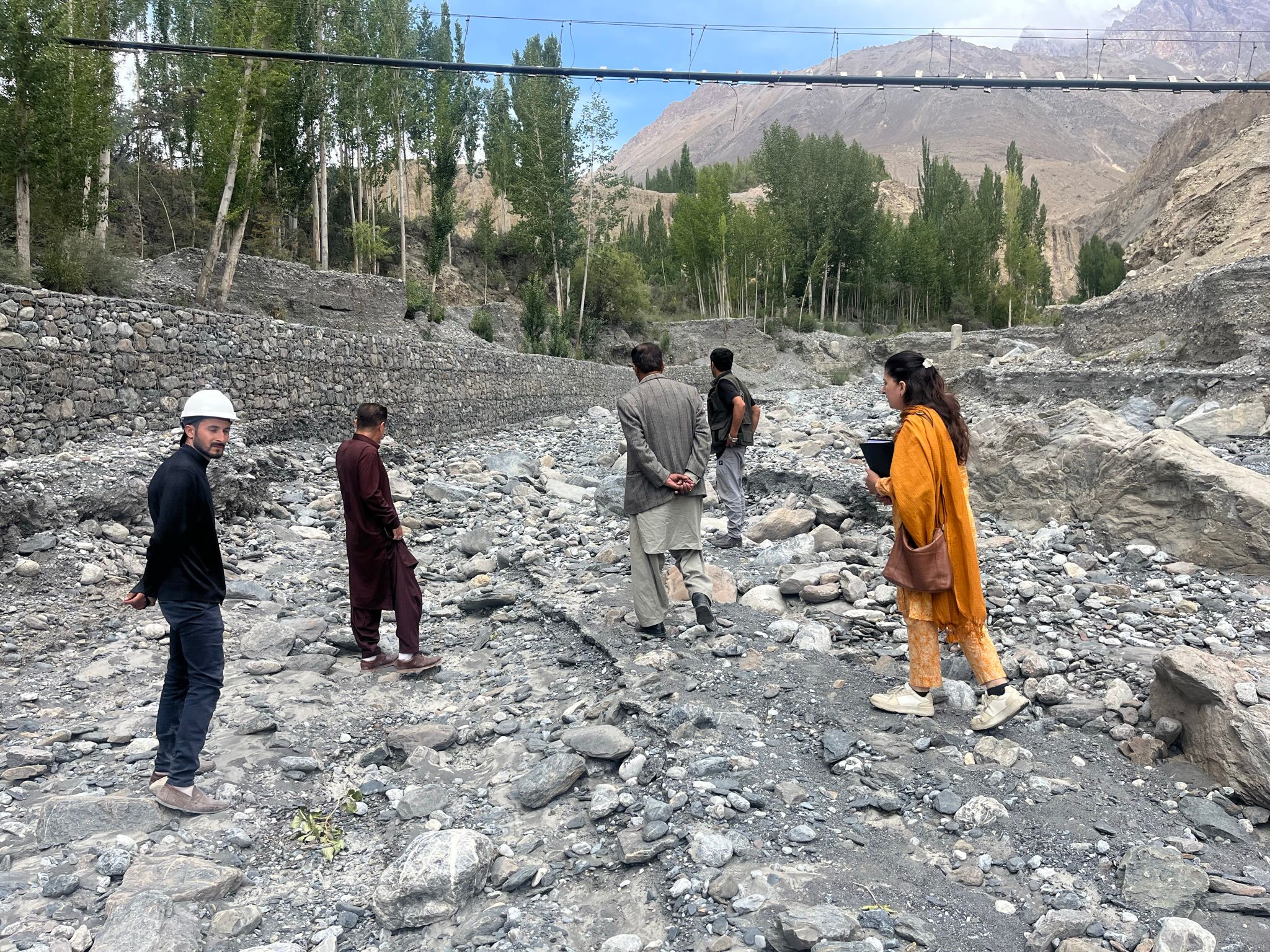
Architect and spatial planner Sabuhi Essa, who is studying for a PhD in Civil Engineering, has been featured in a new portrait series celebrating women scientist-entrepreneurs at the University of Cambridge.
At Cambridge, I have discovered a new kind of knowledge, the knowledge of science creation. It's a profound way of thinking that allows you to see the world in a more logical, structured way.
Sabuhi Essa
The Drawn to Lead exhibit, curated by Dr Ghina M Halabi, was unveiled during the 2025 EnterpriseWOMEN Showcase at the Cambridge Judge Business School.
Sabuhi is one of five women selected for “their deep engagement with the EnterpriseWOMEN programme, the quality of their work and the richness of their personal and professional journeys, standing as symbols of a much larger collective: diverse, ambitious and often unseen”.
The portrait of Sabuhi by scientist-artist Dr Tennie Videler shows her amid the Hunza Valley of Pakistan, where she grew up, with design sketches in hand. The inclusion of three lions visible on the University's Coat of Arms point to Sabuhi’s global journey and personal support system – namely her father, husband and brothers. “It’s a portrait of a woman building, not just buildings, but possibilities,” says Dr Videler, who used pen and ink to create the A3-sized artwork.
Sabuhi credits Dr Videler with capturing the most important things in her life: the mountain communities; women’s empowerment; motivation and support from her parents, husband and brothers; and the value of research and innovation in building for the future.
“At the reveal of the art piece, I was stunned by how Dr Videler had captured the story that I had shared with her,” said Sabuhi. “The portrait shows my deep association with the mountains where I grew up.”
She added: “The mountain communities have witnessed rapid urbanisation within a short span of time. A road, modern agriculture, education and tourism, Hunza had all the appurtenances of development in a short span of 30 years, but now the locals are left longing for the traditional past.
“The portrait captures many things. Firstly, my drive to serve the mountain communities under the impacts of climate change, modernisation and rapid urbanisation; secondly, women’s empowerment in a field that is mainly male dominated (but with support from the men in my life: my father who gave me the vision, my two brothers who pushed and motivated me, and my husband, who has supported and guided me through this process); and thirdly, how research and innovation can help us build environments that are safe, resilient, and keep cultural identity intact.”

Sabuhi at work by artist Dr Tennie Videler (pictured). Credit: EnterpriseWOMEN / Dr Tennie Videler.
An entrepreneurial journey
After graduating as an architect, Sabuhi co-founded a company, Essa Noor Associates, with her brothers and husband, who are also architects. The company is named in honour of her late father, architect Essa Khan, who was the first specialised architect in the region with a master’s degree from the UK. It also acknowledges her mother Noor's contributions to the community as a devoted social worker.
Initially, they focused on commercial and residential projects for a privileged segment of society, but after a few years, they realised that this was not the path that they truly wanted to pursue.
“We aspired to make a more meaningful contribution to society,” said Sabuhi. “Inspired by the impactful work of the Aga Khan Trust for Culture in Gilgit-Baltistan, located in northern Pakistan, and my late father architect Essa Khan, a pioneer in heritage conservation, we shifted our focus to heritage preservation in regions affected by conflict and climate-induced disasters.”
During her Master’s in Spatial Planning for Regions in Growing Economies at TU Dortmund University, in Germany, and Ardhi University, in Dar es Salaam, Tanzania, Sabuhi developed an interest in understanding why planning often fails in developing countries. She was then given an opportunity to work as a senior urban designer in the master planning of Gilgit city, the capital of Gilgit-Baltistan.
“This has been one of my most fulfilling jobs; it was like a dream come true, a chance to plan the city that I grew in and which I call home, a city where I have played in the streets, walked through orchards and crop fields to get to my school. I felt like this was my chance to bring the change.
“Working closely with the local authorities, experts in the field and the ruling politicians, we prepared a comprehensive masterplan for the Gilgit city. It was also a very special project as I enjoyed becoming a voice for the locals of Gilgit city on the discussion tables of bureaucrats, planners and decision-makers, where actual decisions are made.
“Unfortunately, the masterplan is now on hold. I was again back to the question: why does planning fail? An easy answer is a change of political interest or a lack of financial resources. But I knew it was more complex than what we see on the surface.
“Aside from this, I observed a huge limitation with the sectoral silos where non-governmental organisations, local authorities, politicians, the private sector and local communities are working in their own bubble, without any integration of ideas and knowledge. This is what sparked my interest in complex adaptive systems and a systems thinking approach, which helps us in understanding interdependencies and interconnections within various factors of a complex problem.”
Joining EnterpriseWOMEN

Sabuhi, pictured far right, alongside members of her cohort at the 2025 EnterpriseWOMEN Showcase. Credit: EnterpriseWOMEN.
Sabuhi was initially drawn to the EnterpriseWOMEN programme to build confidence and connect with other entrepreneurial women.
“Despite my region being one of the most progressive in terms of women's education in Pakistan, construction remains a male-dominated field,” she said. “One of the reasons I joined the EnterpriseWOMEN programme was to build the confidence that women need in male-dominated fields, especially in countries like Pakistan.”
She added: “During a site visit in my hometown, I asked an elderly labourer how long he thought it would take to finish plastering the walls. His response was dismissive; he told me it was none of my business and that I should go fetch some tea for the crew. I recognised this as a naive reply, indicative of the common challenges faced in my region by female engineers, architects and site supervisors in a predominantly male industry.
“I was attracted to the EnterpriseWOMEN programme for its focus on impactful business practices, investment opportunities, and the chance to connect with other inspiring women who are making a difference.
“Before this learning experience, I had little understanding of how to navigate numbers, create business plans and assess financial risks. I thoroughly enjoyed the course, which not only inspired me but also provided practical knowledge on financial aspects essential for running a business.”
Embarking on a PhD at Cambridge

Sabuhi can be seen during fieldwork for her PhD last summer, engaging directly with local stakeholders in the Himalayan valleys. Credit: Sabuhi Essa.
Sabuhi’s PhD at Cambridge is focused on understanding how a systems-based collective action approach can reshape flood resilience planning and decision-making in high-risk and underdeveloped Himalayan mountain regions.
Sabuhi is based at the Cambridge Centre for Smart Infrastructure and Construction (CSIC) under the supervision of Dr Sakthy Selvakumaran and she is co-supervised by Professor Nazia Habib at the Cambridge Centre for Resilience and Sustainable Development (CRSD).
“Through my PhD research, I want to draw attention to my fellow researchers and scientists to conduct case studies in the remote regions that are at high risk of climate change impacts,” she said. “The Himalayan mountains – an area two-and-a-half-times the size of the UK – are where we need more research on climate crises; opportunities in learning from traditional knowledge; innovation in risk assessment studies; innovation in infrastructure planning and construction; and many more untouched topics.”
She added: “During my PhD, I found that only 3% of existing literature on flood resilience focuses on the Himalayan mountains. Of these, 3% are also mostly hydrological studies or risk assessment studies.
“Considering the devastations of floods this year and the past few years in Gilgit-Baltistan, this research remains extremely important and timely. I have been lucky to work with Professor Habib, who is an expert in systems thinking. I am using one of her proven methods in my PhD and created a tailored CRSD collective action framework for flood infrastructure resilience planning in high-risk regions. In short, this method not only helps in identifying the weakest links in a complex system but also helps in identifying the leverage points, providing opportunities for collective action to improve the system outcomes.”
The next chapter
Sabuhi received the UCA-Cambridge Trust Scholarship award for her PhD as part of the faculty development programme at the University of Central Asia. On the completion of her PhD, she plans to return to industry and continue collaborating with academics, especially with the University of Central Asia, which is one of the world’s only universities that focuses on research relevant to high-risk and underdeveloped mountain regions.
Sabuhi credits Cambridge with giving her the gift of a new way of thinking:
“Cambridge is a place that has ignited a deeper love for science and logic within me. As an architect, my skills have always been focused on creating spaces that are shaped by experiences, context and technicalities.
“Coming to the Department of Engineering and being surrounded by fellow scientists, Cambridge has added a new dimension to my artistic self.
“I have discovered a new kind of knowledge, the knowledge of science creation. While it may seem simple to some, it's a profound way of thinking that allows you to see the world in a more logical, structured way.”
Coming to Cambridge with two kids while doing a PhD was not easy at all. This would have been an unimaginable dream without the support from my family, friends, and of course my sponsors UCA and Cambridge Trust, and my amazing supervisors. This story is for all those amazing women out there who dare to dream.
Adapted from a Cambridge Judge Business School news article.

